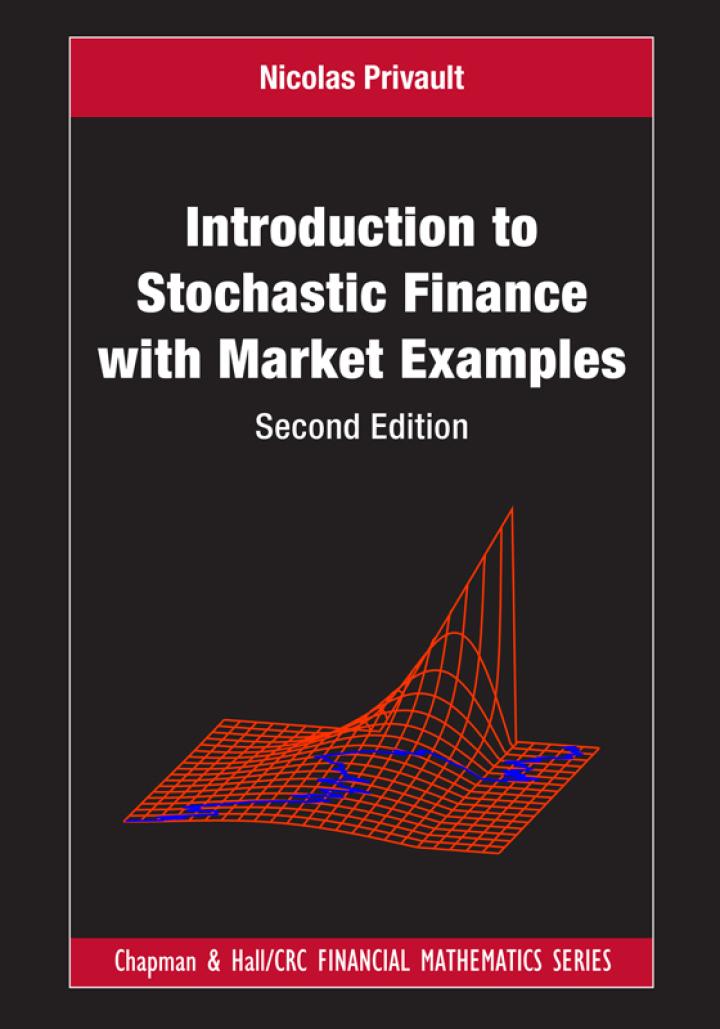We consider the discrete-time Cox-Ross-Rubinstein model on (N+1) time instants (t=0,1, ldots, N), with a riskless asset
Question:
We consider the discrete-time Cox-Ross-Rubinstein model on \(N+1\) time instants \(t=0,1, \ldots, N\), with a riskless asset whose price \(A_{t}\) evolves as \(A_{t}=A_{0}(1+r)^{t}\) with \(r \geqslant 0\), and a risky asset whose price \(S_{t}\) is given by
\[
S_{t}=S_{0} \prod_{k=1}^{t}\left(1+R_{k}ight), \quad t=0,1, \ldots, N
\]
where the asset returns \(R_{k}\) are independent random variables taking two possible values \(a\) and \(b\) with \(-1
\[
p^{*}=\mathbb{P}^{*}\left(R_{t+1}=b \mid \mathcal{F}_{t}ight)=\frac{r-a}{b-a}, \quad q^{*}=\mathbb{P}^{*}\left(R_{t+1}=a \mid \mathcal{F}_{t}ight)=\frac{b-r}{b-a},
\]
\(t=0,1, \ldots, N-1\), where \(\left(\mathcal{F}_{t}ight)_{t=0,1, \ldots, N}\) is the filtration generated by \(\left(R_{t}ight)_{t=1,2, \ldots, N}\).
a) Compute the conditional expected return \(\mathbb{E}^{*}\left[R_{t+1} \mid \mathcal{F}_{t}ight]\) under \(\mathbb{P}^{*}, t=0,1, \ldots, N-1\).
b) Show that the discounted asset price process
\[
\left(\widetilde{S}_{t}ight)_{t=0,1, \ldots, N}:=\left(\frac{S_{t}}{A_{t}}ight)_{t=0,1, \ldots, N}
\]
is a (nonnegative) \(\left(\mathcal{F}_{t}ight)\)-martingale under \(\mathbb{P}^{*}\).
Hint: Use the independence of asset returns \(\left(R_{t}ight)_{t=1,2, \ldots, N}\) under \(\mathbb{P}^{*}\).
c) Compute the moment \(\mathbb{E}^{*}\left[\left(S_{N}ight)^{\beta}ight]\) for all \(\beta>0\).
Hint: Use the independence of asset returns \(\left(R_{t}ight)_{t=1,2, \ldots, N}\) under \(\mathbb{P}^{*}\).
d) For any \(\alpha>0\), find an upper bound for the probability
\[
\mathbb{P}^{*}\left(S_{t} \geqslant \alpha A_{t} \text { for some } t \in\{0,1, \ldots, N\}ight) \text {. }
\]
Hint: Use the fact that when \(\left(M_{t}ight)_{t=0,1, \ldots, N}\) is a nonnegative martingale, we have
\[
\begin{equation*}
\mathbb{P}^{*}\left(\underset{t=0,1, \ldots, N}{\operatorname{Max}} M_{t} \geqslant xight) \leqslant \frac{\mathbb{E}^{*}\left[\left(M_{N}ight)^{\beta}ight]}{x^{\beta}}, \quad x>0, \quad \beta \geqslant 1 . \tag{2.18}
\end{equation*}
\]
e) For any \(x>0\), find an upper bound for the probability
\[
\mathbb{P}^{*}\left(\underset{t=0,1, \ldots, N}{\operatorname{Max}} S_{t} \geqslant xight)
\]
Hint: Note that (2.18) remains valid for any nonnegative submartingale.
Step by Step Answer:

Introduction To Stochastic Finance With Market Examples
ISBN: 9781032288277
2nd Edition
Authors: Nicolas Privault





